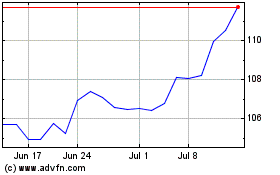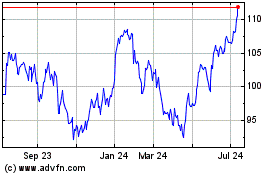Novartis Profit Hurt by U.S. Settlement -- 4th Update
October 27 2015 - 11:15AM
Dow Jones News
By Denise Roland and John Letzing
ZURICH-- Novartis AG said Tuesday that third-quarter profit fell
42% from the same period last year, as the Swiss drug giant settled
claims that it paid rebates to encourage specialty pharmacies to
increase prescriptions.
The Basel, Switzerland-based pharmaceuticals giant said agreed
to pay $390 million as part of a settlement with the U.S. Justice
Department regarding claims that the company induced specialty
pharmacies to boost prescriptions for Novartis drugs by paying
kickbacks in the form of rebates.
Chief Executive Joe Jimenez said the rebates were designed to
incentivize specialty pharmacies to ensure that patients completed
a course of medicine. He added that Novartis still used this "quite
common" practice at specialty pharmacies in the U.S. "We continue
to maintain that specialty pharmacies must continue to play a role
in ensuring patient adherence," he said. "How that's going to play
out as to whether we change our behavior or not remains to be
seen."
The settlement relates to a June court filing by the Justice
Department based on earlier whistleblower allegations from a former
sales manager, who accused the company of using illegal kickbacks
to boost sales of two drugs and sought up to $3.35 billion in
damages and fines. The case centered on separate issues from those
currently plaguing Valeant Pharmaceuticals International Inc. over
its relationship with mail-order specialty pharmacy Philidor Rx
Services LLC.
Novartis said the settlement hasn't been finalized and that it
neither admits nor denies liability. It is "something we want to
put behind us and that's why we've reached an agreement and
settlement in principle," said Mr. Jimenez.
The settlement hurt Novartis's net income, which fell to $1.81
billion, or $0.75 a share in the quarter ended in September,
compared with $3.1 billion, or $1.27 a share a year earlier. The
year-earlier figure included a one-time gain of around $800 million
from a divestment.
Core net income, which strips out one-time events such as
settlements, impairments, or gains, fell 2% to $3.06 billion,
Novartis said. Net sales fell 6% to $12.27 billion.
Stripping out the effect of the strong dollar, core net income
increased 13% and sales increased 6%.
Analysts had expected core net income of $3.2 billion for the
third quarter, and sales of $12.7 billion.
The miss was largely due to a weak performance by Novartis's
eye-care division, Alcon, which is facing increased competition for
its surgical products and the entry of cheaper generics on a number
of its drugs. Net sales at Alcon were $2.3 billion and core
operating income was $703 million, down 2% and 12% in constant
currencies.
Mr. Jimenez said the company was developing a "growth
acceleration plan" for Alcon which would involve increasing
innovation. He said Novartis would update its outlook for Alcon in
its full-year results in January.
Third-quarter sales at Novartis's dominant pharmaceuticals
division increased 7% at constant currencies to $7.6 billion,
missing analyst expectations of $7.8 billion. The company said
growth was mostly driven by seven products, including a combination
treatment for metastatic melanoma that it acquired as part of its
$20 billion asset-swap deal with GlaxoSmithKline PLC. Core
operating income was $2.4 billion, up 18% in constant
currencies.
Mr. Jimenez said this "tremendous margin improvement" was down
to the company's efforts to eliminate duplication between its three
business units on back-office functions such as IT, accounting and
procurement.
The Novartis boss also said he expected uptake of new potential
blockbuster Entresto, for chronic heart failure, to speed up next
year after federal health-care plans make decisions on
reimbursement. The drug, introduced in July, has had a slow start
since two-thirds of heart failure patients are covered by Medicaid,
which can delay reimbursement decisions for six months post-launch,
said Mr. Jimenez.
Sandoz, the company's generics division, posted sales of $2.3
billion, 9% higher than a year earlier in constant currencies, in
line with analysts' expectations. The company attributed this to
volume growth offsetting price erosion.
Earlier this year, Sandoz launched a copycat version of Amgen
Inc.'s Neupogen in the U.S., making it the first so-called
biosimilar to enter the American market. Mr. Jimenez said the
launch had gone "quite well" but warned it would "take some time to
build up" since pharmacies didn't automatically substitute Neupogen
with Sandoz's product Zarxio.
Novartis said it was on track to deliver percentage net-sales
growth in the mid-single digits and core-operating-income growth in
the high single digits, based on continuing operations at constant
currencies, confirming earlier guidance.
Novartis shares were down 1.6% in afternoon trading Tuesday.
Write to Denise Roland at Denise.Roland@wsj.com and John Letzing
at john.letzing@wsj.com
Subscribe to WSJ: http://online.wsj.com?mod=djnwires
(END) Dow Jones Newswires
October 27, 2015 11:00 ET (15:00 GMT)
Copyright (c) 2015 Dow Jones & Company, Inc.
Novartis (NYSE:NVS)
Historical Stock Chart
From Mar 2024 to Apr 2024

Novartis (NYSE:NVS)
Historical Stock Chart
From Apr 2023 to Apr 2024
